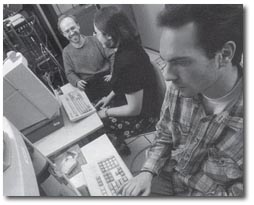and the Individual

What implications does the Constitution have on the Internet and the individual?
• The First Amendment guarantees the individual the right to free speech; a right reinforced by the Supreme Court's ruling against the Communication Decency Act.
• The Fourth Amendment protects the individual against unreasonable searches and seizures. Many Americans fear that the Patriot Act impedes upon the rights illustrated in the Fourth Amendment.• Two members of the Notre Dame Webgroup, Professor Albert Barabasi and Professor Sheri Alpert, fear that their personal rights and freedoms are threatened by the Patriot Act.
• Click to see how law students at Harvard University address the relationship between the individual and the Internet

What implications does recent legislation have on the Internet and the individual?
• The Communications Decency Act was passed (and later declared void by the Supreme Court) along with others in the Telecommunications Acts of 1996.• The CDA attempted to "provide protections against harassment, obscenity and indecency to minors by means of telecommunications devices."
• In the Supreme Court's decision a large battle was won for the protection of free speech on the internet.
• News.com believes the decision was monumental for internet users everywhere.

• Soon after the attacks of September 11, 2001, Congress passed the Patriot Act to "deter and punish terrorist acts in the United States and around the world, to enhance law enforcement investigatory tools, and for other purposes." Click to hear Dennis Kucinich 's remarks and Daniel Ellsberg's opinion regarding the Patriot Act.
• The Electronic Frontier Foundation (EFF) believes that the Patriot Act "has given sweeping new powers to both domestic law enforcement and international intelligence agencies and has eliminated the checks and balances that previously gave the courts the opportunity to ensure that these powers were not abused."
• LifeandLiberty.gov believes otherwise. They maintain that the Patriot Act "unites and strengthens America by providing appropriate tools required to intercept and obstruct terrorism."
• Click to see the results of a survey in which 29 Notre Dame students and 26 Notre Dame parents responded to questions regarding Internet regulation by the government and how it affects them personally.

• In order to bridge the Digital Divide, many public places such as libraries and schools have begun providing access to the Internet.
• Congress passed the Children's Internet Protection Act in 1999 to require public places to filter out certain websites.
• The American Civil Liberties Union (ACLU) thinks that "the government is choking off the free flow of information on the Internet to the library patrons who need it the most."
• The Supreme Court, however, overturned a decision by a lower court and maintained the consitutionality of the CIPA.
• In 2003, Congress passed the Global Internet Freedom Act to "develop and deploy technologies to defeat internet jamming and censorship, and for other reasons." Both the domestic and international response has been mixed, though one British citizen reacted positively to the news.